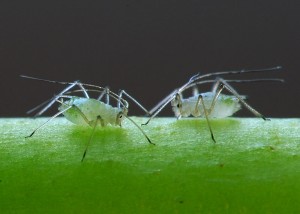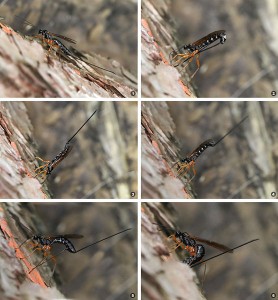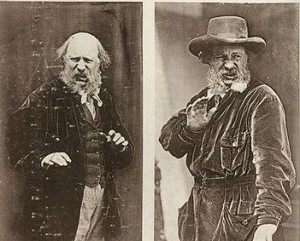
I was going about life one day, visiting my step-daughter the entomologist who showed me, in a microscope, a pale green little aphid which was eating a leaf. Inside the aphid was a tiny parasitic wasp which was eating the aphid. Through the aphid’s transparent body, I could see the wasp’s buggy little eyes. I jumped away from the microscope and said, “Ick, ick, ick.” My step-daughter just shrugged: “The aphids just go right on eating. They’re awfully dumb.”

The picture here kindly shows us the process — go ahead, click & blow it up — only not with aphids but with some hapless thing under the tree bark: #1, the parasitic wasp taps her antennae on the bark and listens for echos of something underneath; #2, the parasitic wasp drills through the bark; #3, the parasitic wasp drills into the something underneath; #4, the parasitic wasp corrects for the optimal position; #5, she lays her eggs; #6, she continues laying eggs. Eventually the eggs hatch and the wasp larvae will eat the hapless thing from the inside out.
And here’s the worst part: Heather and Josie, my co-bloggers who are good and generous people, who dislike violent movies, who think of themselves as kind-hearted, “find parasites of all forms really fascinating,” says Heather. Josie says she thinks of “parasites as part of the great web of life.” To them I declare, parasites are not part of any great web of life that I feel I’m part of.

I have excellent, if dated, support in this. Charles Darwin wrote that he could not persuade himself “that a beneficent and omnipotent God would have designedly created” parasitic wasps.” Other Victorian naturalists, writes Stephen Jay Gould, a Harvard natural historian, were torn between knowing wasps weren’t human and their own “grim horror and fascination” that was less pity for the aphid and more admiration of the efficiency of the wasp. The Victorian naturalists’ dilemma amused Gould, clearly a modern who thought that nature was nonmoral, that human reactions are irrelevant to wasps and aphids, and who is clearly good company for Heather and Josie. I think nature is nonmoral too but that doesn’t make me less creeped out. Nor am I any less appalled to live in a world with such things in it. Gould goes on to quote Darwin – who, the more you know about him the smarter he seems – saying, “I feel most deeply that the whole subject is too profound for the human intellect. A dog might as well speculate on the mind of Newton.”
_______
Parts of this post come from a 1/24/99 book review I wrote for the New York Times Book Review.
Photo credits:
Aphids, Luc Viatour, www.lucnix.be, Wikimedia Creative Commons
Parasitic wasp and explanation, Richard Bartz, Wikimedia Creative Commons
Victorian naturalists, from Charles Darwin’s The Expression of the Emotions in Man and Animals.
It’s the parasites that are dumb. Why would you deliberately kill the organism you depend on for your life? (Unless you’re a human being of course.)
Symbionts are the smart ones – develop a working relationship. (Some humans actually seem to manage this, even with other sorts of creatures!)
Darwin was dumb in some areas too. There are lots of things a beneficent and omnipotent God wouldn’t have incorporated into the design, parasitic wasps being amongst the least. So have a closer look at your major premise, Chas?
These particular parasites don’t kill their hosts, they just eat the hosts from the inside out and when they’re ready to hatch, the host is eaten up. I object to that most strictly but the parasites don’t seem to care.
Darwin was responding less to my moral revulsion than to the Victorian naturalists’ equation of moral revulsion with evil, and the subsequent question of how a good God can allow evil. I do agree, lots of things are worse than parasitic wasps.